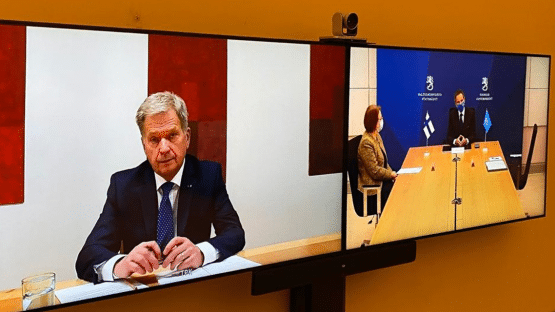The use of nuclear energy in support of climate change goals was among the main topics of discussion yesterday between International Atomic Energy Director General (IAEA) Director General Rafael Mariano Grossi and President Sauli Niinistö of Finland. In addition, the discussions focused on nuclear verification and possibilities for cooperation in nuclear safety projects in the Arctic.
“Finland and the IAEA have a common interest in nuclear safety and security […] both globally and in the Arctic region,” Mr Niinistö said in a tweet today.
Mr Grossi and President Niinistö discussed strengthening cooperation between Finland and the IAEA. Also on the agenda was the the upcoming Tenth Review Conference of the Parties to the Treaty on the Non-Proliferation of Nuclear Weapons. Furthermore, they discussed nuclear verification in Iran, including the implementation of the JCPOA agreement.
Meetings with ministers
Mr Grossi also met the Ministers of Foreign Affairs,Pekka Haavisto, and for Development Cooperation and Foreign Trade, Ville Skinnari. A meeting with the minister of Economic Affairs Mika Lintilä was also in the programme. In addition, he met the Director General of the Energy Department at the Ministry of Economic Affairs and Employment, Riku Huttunen. He also met the Director General of Finland’s Radiation and Nuclear Safety Authority (STUK), Petteri Tiippana.
Discussion topics included nuclear safety and security, safeguards implementation and Finland’s energy strategy. In addition they discussed the Agency’s initiative on Nuclear Technology for Controlling Plastic pollution (NUTEC Plastic). Furthermore, the modernization of the IAEA’s laboratories in Seibersdorf (ReNuAL). The talks also focused on the peaceful uses of nuclear technology in countering climate change, gender parity and the IAEA’s Marie Sklowdowska Curie Fellowship Programme. To learn more about the programme, click here.
IAEA´s services fo member states
“Finland is grateful for all the IAEA support, such as the peer review services it has benefited from and will continue to benefit from in the coming years,” said Liisa Heikinheimo. She is responsible for nuclear energy as Deputy Director General of the Energy Department at the Ministry of Economic Affairs and Employment. The IAEA offers its Member States a wide array of review services. This includes IAEA-led team of experts comparing actual practices with IAEA standards in nuclear safety and security and other areas.
Peer review missions to Finland include International Physical Protection Advisory Service (IPPAS) missions in 2009 and 2012. In addition, there were Integrated Regulatory Review Service (IRRS) missions in 2012 and 2015 and Operational Safety Review Team (OSART) missions in 2018, 2019 and 2020.
“Finland also thanks the IAEA for all the activities it has been running to assist in the COVID-19 pandemic,” Heikinheimo said. “Fortunately, during the pandemic Finland has kept operating its nuclear power plant units.”
Nuclear energy: the Finnish way
One third of Finland’s electricity comes from nuclear power. It is expected to rise to over 40% by next year. Then three new reactor units currently in the final phases of construction come into operation. The country’s two nuclear power plants located off the shore of the Baltic Sea are among the world’s most productive, according to the World Nuclear Association.
The European Union country of 5.5 million people has relied on the atom to supply power and heating to its population and energy-intensive industry since 1977. Now, Finland is an active participant in the Global Health Security Agenda. It focusses on creating resilience to the impacts of climate change. The government envisions a mix of renewable sources and nuclear energy as key in achieving its proudest goal: becoming carbon-neutral by 2035.
“Nuclear energy is part of the solution of many of the problems we have in the world, including the need for energy and the need to effectively tackle the climate change crisis,” Mr Grossi said during his visit.
Two day visit
Mr Grossi also visited the VTT Technical Research Centre of Finland Ltd today, one of Europe’s leading research institutions. VTT has acted as the key technical support organization to STUK as concerns nuclear reactors in Finland. About 27% of Finnish innovations are completely or in part results of VTT’s expertise. The IAEA cooperates with the centre on topics such as Small Modular Reactors, fast reactor neutronics, emergency response and cancer treatment.
Today is the second day of Mr Grossi’s two-day official visit to Finland, during which he also plans to visit ONKALO, the first ever deep geological repository for spent nuclear fuel under construction in Olkiluoto.






